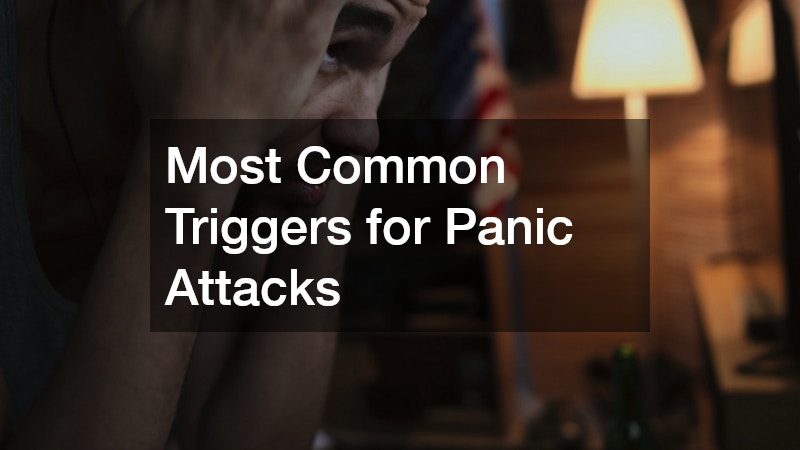Panic attacks are sudden episodes of intense fear or discomfort that peak within minutes and typically involve symptoms like palpitations, chest pain, shortness of breath, and dizziness. While they aren’t life-threatening, panic attacks can severely impact quality of life, leading to anxiety about future attacks and avoidance of potential triggers.
In the general population, they are surprisingly common, with estimates suggesting that one in four people may experience a panic attack at some point in their lives. The impact on mental health is significant, often leading to chronic anxiety, depression, or the development of panic disorder.
Understanding the triggers of panic attacks is crucial for prevention and management. By identifying environmental, lifestyle, mental health, and physiological factors that contribute to these events, individuals can better prepare and possibly avoid situations that increase their risk of panic episodes.
1. What are the most common environmental triggers for panic attacks?
1.1 Crowded or Confined Spaces
The sensation of being trapped in a crowded or small space can trigger severe anxiety and panic for many individuals. This fear often stems from a perceived lack of control or escape, leading to heightened physiological arousal and panic symptoms.
Places like packed subways, crowded elevators, or even small, enclosed rooms can be sources of significant stress. The sensory overload from these environments, combined with the fear of being unable to exit quickly, can exacerbate feelings of panic.
Therefore, individuals who are prone to panic attacks might attempt to avoid such situations, which can reinforce their fears and potentially limit their daily activities. Awareness and gradual exposure therapy can serve as effective strategies in mitigating the anxiety associated with confined spaces.
1.2 High-Stress Situations
High-stress situations can significantly increase the risk of experiencing a panic attack. Job pressure, for instance, often contributes to chronic stress levels, creating a fertile ground for acute anxiety episodes.
Personal conflicts, whether at work or at home, can act as immediate triggers due to the emotional turmoil and uncertainty they generate. Financial problems, too, are a common stressor that elevates anxiety, as they often involve a perceived threat to one’s stability and future security.
Managing stress through techniques such as mindfulness, exercise, and professional counseling can reduce the frequency of panic attacks related to high-stress situations. It’s crucial to identify personal stress triggers and develop coping strategies to handle them better.
2. Can lifestyle habits trigger panic attacks?
2.1 Dietary Choices and Stimulants
Diet plays a significant role in mental health, with certain foods and beverages known to exacerbate anxiety symptoms. Excessive intake of caffeine, found in coffee and energy drinks, can mimic anxiety symptoms, increasing jitteriness and heart rate.
Sugar, too, can have an impact, as it causes rapid fluctuations in blood sugar levels, which might lead to mood swings and anxiety episodes. A balanced diet with controlled consumption of stimulants is critical for individuals susceptible to panic attacks.
Moreover, staying hydrated and ensuring balanced nutritional intake can naturally support a stable mood and reduce the risk of panic attacks triggered by dietary habits. Monitoring and gradually adjusting these habits are essential for long-term mental health care.
2.2 Sleep Patterns
Inadequate or irregular sleep patterns can dramatically affect mental health, often increasing vulnerability to anxiety and panic attacks. When the body doesn’t get enough rest, stress hormones remain elevated, which can exacerbate feelings of panic.
Sleep deprivation also affects cognitive function, making it harder to manage stress effectively and maintain emotional balance. As a result, individuals may find themselves more reactive to stressors and prone to panic attacks.
Establishing a healthy sleep routine, including regular bedtimes and a conducive sleep environment, can significantly reduce the frequency of sleep-related panic attacks. Prioritizing sleep as part of overall mental health management is crucial.
3. How do underlying mental health conditions influence panic attacks?
3.1 Anxiety Disorders
Anxiety disorders are closely linked to the occurrence of panic attacks, with generalized anxiety disorder and social anxiety disorder being common co-occurring conditions. These chronic mental health issues often create a baseline level of anxiety, increasing the likelihood of acute panic episodes.
Individuals with anxiety disorders may misinterpret physical sensations as dangerous, leading to a heightened state of arousal and resulting in panic attacks. This link underscores the importance of treating underlying anxiety disorders to manage panic symptoms effectively.
Cognitive-behavioral therapy (CBT) and medication can serve as effective treatments for anxiety disorders, thereby reducing the occurrence of panic attacks. Early diagnosis and treatment of anxiety disorders are critical for improving quality of life.
3.2 Post-Traumatic Stress Disorder (PTSD)
PTSD is another mental health condition that significantly increases the risk of panic attacks. Individuals with PTSD often re-experience past traumas through flashbacks or nightmares, which can trigger panic attacks.
The hyperarousal characteristic of PTSD means that sufferers live in a heightened state of alertness, making them more prone to panic when confronted with reminders of their trauma. Professional treatment for PTSD, such as therapy and medication, can help manage these symptoms.
Understanding the intimate connection between PTSD and panic attacks is essential for effective treatment and recovery. Health professionals can develop comprehensive plans that address both the trauma and its panic-related symptoms.
The triggers of panic attacks are multifaceted, encompassing environmental, lifestyle, mental health, and physiological factors. Recognizing these triggers is vital to developing effective strategies for managing and preventing panic episodes.
Strategies such as lifestyle modifications, cognitive-behavioral therapy, and medical interventions should be considered for addressing the diverse triggers of panic attacks. Seeking professional guidance is crucial for individuals to regain control over their lives and achieve better mental health outcomes.


